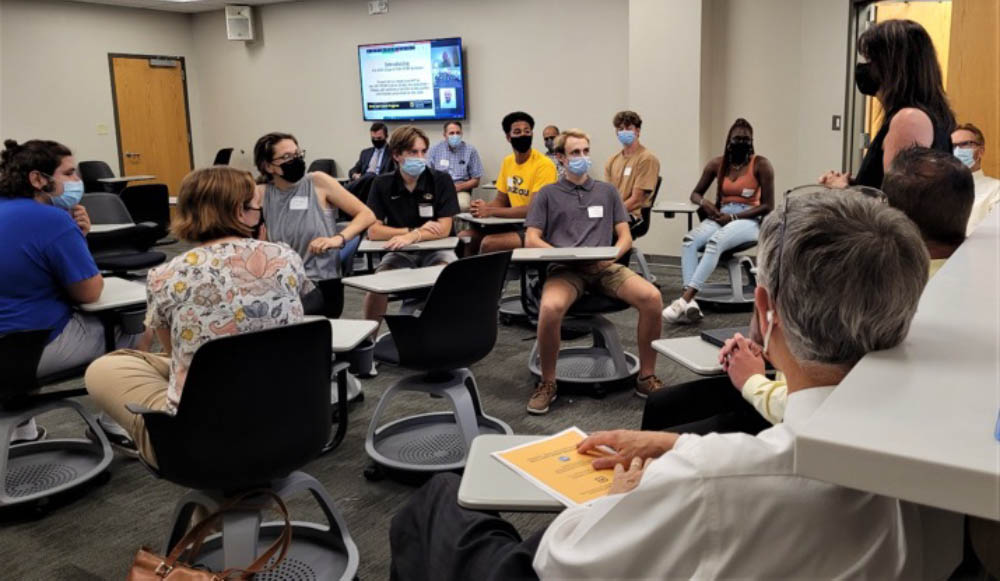December 02, 2021

CEE S-STEM Scholars listen to project leaders during a Meet and Greet event held earlier this semester.
A new scholarship program within the Department of Civil and Environmental Engineering provides students with more than tuition money. Funded by the National Science Foundation, the five-year, million-dollar Scholarships in Science, Technology, Engineering and Mathematics (S-STEM) project also gives recipients a holistic support network to help them through their first two years of college. A total of 32 incoming freshmen and master’s students will benefit from the financial, academic and work-force training support.
“The idea is to generate knowledge on how best to make students successful to stay within STEM areas and earn a degree,” said Professor Vellore Gopalaratnam, principal investigator of the program. “In addition to scholarship funding and the recognition that comes with being affiliated with a prestigious NSF supported project, it provides scholars academic and professional support as and when needed.”
Each of the recipients meets individually with Gopalaratnam monthly, and the group gets together regularly for field trips and social events such as community service projects.
“One of the observations by many in the education field is that ‘sense of community’ is important to the well-being and success in demanding STEM degree programs,” Gopalaratnam said. “The S-STEM scholars know they have a support mechanism and a network to depend on so they can contribute to the well-being of others in the group as well as reach out to them if they need help.”
Seven undergraduate and one master’s student make up the first cohort of S-STEM Scholars. Students come from a variety of backgrounds, but all are competitively selected based on academic excellence and financial need.
And that’s a key demographic, especially for civil engineering. Considered the oldest engineering discipline, civil engineering has a direct impact on communities and neighborhoods. It’s important that those working in the field represent all points of view, said Associate Professor Sarah Orton, who is co-PI of the project.
“Equity in infrastructure is a big conversation,” she said. “If you have engineers with different backgrounds, you increase a team’s understanding of the impact of a project on a neighborhood, and maybe offer a reason to find a different solution.”
Civil engineers also contribute to decision-making around policies and regulations that impact all socio-economic communities.
“Civil engineering, more than any other engineering in my mind, greatly benefits from diversity and programs such as this,” Gopalaratnam said. “Almost all civilian applications focus on community service, as civil engineers build highways, structures, water supply systems. Everything is focused on community, and you need to have a diverse perspective to serve the community equitably.”
S-STEM scholars might not have been able to afford college without the scholarship, and some might be at risk of leaving engineering without extra academic support.
“So, anything new we can do to help on this front benefits not only our department and university, but the country as a whole,” he said.
Recipients are also introduced to successful professionals in the field. Earlier this semester, students met with alumni and industry experts from the Missouri Department of Transportation and HDR Engineering. Gopalaratnam anticipates more interactions in the future, including job shadowing and co-op and internship opportunities with these and new industry partners.
“We’re hoping to have external partners talk to students in a seminar format to keep them engaged in terms of what is happening in the field,” he said. “The idea is to provide students with role models they can look up to in terms of their own goals and aspirations down the road.”
The civil engineering program is also implementing a similar strategy for all incoming freshmen. Starting this fall, students had the opportunity to take Civil Engineering 1000 to learn more about the profession and opportunities in the field, said Orton, who created and teaches the course.
“The goal is to introduce them to the field and each of the five areas within civil engineering,” she said. “We bring in guest speakers from each area to talk about what it’s like in the real world, including senior professionals and recent alumni from small companies and big firms. We want students to start to see themselves in these roles, and hopefully that will give them motivation.”